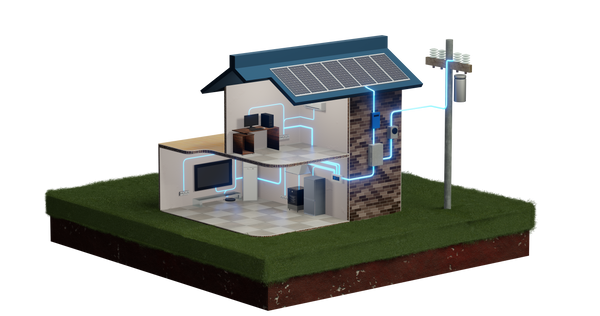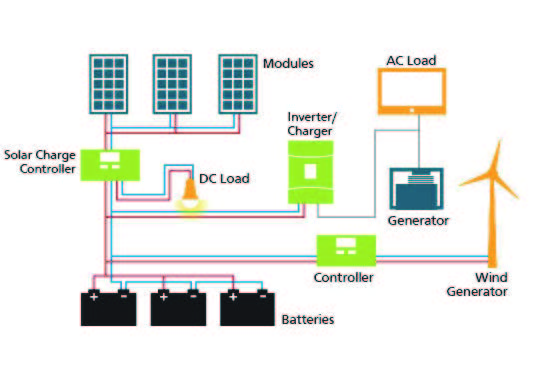
The Difference Between Off-Grid and On-Grid Solar Energy
What Is Off-Grid and On-Grid Solar Energy?
An off-grid solar energy system is not connected to the utility grid, whereas an on-grid (aka grid-tied) solar energy system is connected to the utility grid. Whether off-grid or on-grid system will determine your access to electricity, what happens when the grid goes down, and how you’re billed for electricity.
Difference #1: Your Access to Electricity
1.Electricity Access with Off-Grid Solar
What is meant by off-grid solar systems? With an off-grid solar system, you’re completely reliant on the sun and energy stored in batteries to power your home or business.
If you opt for a solar system that is not tied to the electric grid and you do not have a generator, you will only have electricity at two points:
1.1When the sun is shining and your solar system is producing electricity.
1.2When you’re pulling electricity previously generated by your solar system from a solar storage device, like batteries.
If you do not have batteries or a means to store your energy, you will have less or no electricity when it’s cloudy, and you will not have electricity at night.
With an off-grid system, you will not have access to extra electricity if you need it. What you are producing and what you have stored is all that’s there to power your equipment.
2.Electricity Access with On-Grid Solar
If you decide to install an on-grid solar system, you will always have access to electricity (unless the grid goes down), whether or not your solar system is producing or if you have batteries.
If your system is not producing any electricity or not producing enough electricity to power the devices, lights, machines, etc. that you’re using, you can pull energy from the utility grid to supplement it. This ensures you always have enough electricity for what you need.
Difference #2: What Happens When the Grid Goes Down
1.Power Outages with Off-Grid Systems
Your solar system is working independently from the power grid. If there’s a bad storm or event that knocks out the power, your solar system can continue operating. You won’t notice changes in your service or access to electricity.
2.Power Outages with Grid-Tied Systems
By connecting to the grid, you get access to electricity whenever you need it. However, you’re also subject to some rules. If you have a grid-tied solar system and the grid goes down, you will not have electricity, unless you opt for a grid-tied solar system with battery backup.
Why is this? The shutdown of solar systems when the grid goes down is required by the Underwriters Laboratories (UL 1741). This is for the safety of utility workers who are fixing the power lines.
While this is a disadvantage of grid-tied systems over off-grid systems, if keeping things up and running during a power outage is important to you, then you may be interested in adding batteries to your grid-tied system.
Difference #3: How You’re Billed for Electricity
1.Electricity Bills with an Off-Grid System
If your PV system is not tied to a grid, you won’t receive an electric bill at all. However, even with no electric bill, off-grid systems are often more expensive because of the additional equipment like batteries that are needed to make it viable.
2.Electricity Bills with a Grid-Tied System
If you opt for a grid-tied system, you could still see a few minimal charges on your electricity bill, even if your solar system provides 100% of your electricity.
Because using a large amount of electricity at one time puts a strain on the grid, the utility will charge a higher rate for the electricity used during that period.
If your peak demand period is during the day, you may be able to reduce it with solar, as energy produced by your system will compensate for some of the energy you use from the grid. If you pay very high demand charges, you may also want to look into peak demand shaving with solar and batteries.
To learn more about photovoltaic power generation, please follow XINPUGUANG official website:
Facebook: Xinpuguang Solar Panel Instagram: xinpuguangsolar
Pinterest: XinpuguangSolarPanels
Homepage: https://xinpuguangsolar.com
Email address: Philip@isolarparts.com
- Le choix d'une sélection entraîne une actualisation complète de la page.


